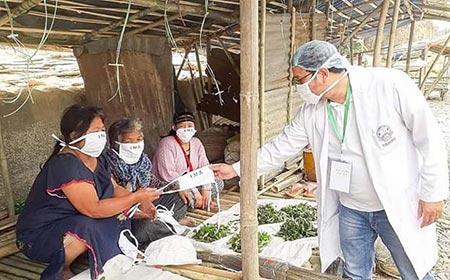 Staff Reporter
Staff Reporter
ITANAGAR, Apr 7: The Indian Medical Association’s Arunachal chapter (IMA-AP) has launched a ‘Mask 4 Arunachal’ campaign, stressing on the importance of wearing facemasks, which it said would help reduce virus transmission in the society by 80 percent.
Briefing reporters at Heema Hospital here on Wednesday, IMA-AP president, Dr Lobsang Tsetim, said, “It has been proved that wearing a facemask drastically reduces the transmission of Covid-19. It has also been documented by the Czech Republic. If 100 percent mask wearing is imposed in the society, there is a drastic reduction of about 80 percent of the virus transmission.”
He said the Centre of Disease Control and Prevention has also directed that facemasks be used.
Informing that there is a scarcity of N95 masks, which are the most effective, Dr Tsetim requested that the N95 masks be reserved for the health workers dealing with patients on a daily basis.
“The N95 mask is the most effective, followed by triple-layered surgical masks. Cotton masks may provide the lowest protection chronologically, but it will help reduce virus transmission tremendously. Masks do not guarantee 100 percent protection. Mask usage has to be combined with physical distancing and personal hygiene,” Dr Tsetim said.
“One out of four Covid-19 patients is asymptomatic, and they may be unaware of their status. If an asymptomatic person goes out and coughs, sneezes or spits in the market areas, infection may spread. The cotton masks will help prevent the droplets from going into the environment and help avoid virus transmission,” he said.
In view of the scarcity of facemasks, the IMA-AP has appealed to weavers, tailors, NGOs, SHGs and individuals to come up with their own ideas for preparing homemade masks.
It also appealed to the people active on social media, particularly the millennials, to popularize the ‘Mask 4 Arunachal’ campaign. One can wear any facemask and post a picture with the hashtag ‘#Mask4Arunachal’ to create a culture of wearing facemasks.
Dr Tsetim requested owners of grocery shops and other essential items to ensure that their customers wear masks.
The IMA-AP also assured to provide logistic support to those who wish to stitch or donate masks. Such persons or groups can call 87949-06352 or 96121-05455 to contact the IMA-AP.
IMA-AP honorary general secretary, Dr Jego Ori, informed that the government of India has issued direction to wear masks while stepping outside homes. He informed that the IMA has procured about 2000 masks, which will be distributed to the shopkeepers, vendors, labourers, and those who have been unable to find masks in the markets, from Wednesday itself.
Dr Ori requested the shopkeepers not to increase the price of masks because of the high demand. “Please do not increase the prices in this time of crisis,” he said.
The IMA-AP has meanwhile received donations from various individuals and groups, by way of cash and homemade masks.
“If there is any difficulty in distribution or other logistics, we are ready to provide assistance,” it said.
The IMA’s district units have also been briefed on starting the programme of free mask distribution.
Facemask etiquette by Dr Kesang Thongdok
Note: Children below five years of age and those with breathing difficulty are advised to remain indoors and not to use masks made of clothing material.
Specifications for homemade masks:
1. Use new material. Avoid old, used clothing.
2. Preferably soft cotton material and double-layered with double stitch at the borders.
3. Breadth of the mask: The mask should cover upto the centre of the nose and below the chin.
4. Sew four straps at the borders.
How to wear a mask:
1. Wash your hands before touching the mask.
2. If one has a mask with elastic bands that go over one’s head: a) Hold the outside of the mask with clean hands, and b) Pull the lower elastic band over and behind your head first, followed by the upper elastic band.
3. If one has a mask with tie-up strings or elastic bands on the sides: a) Hold the mask with clean hands, and b) Slip the mask behind your ears without (preferably) touching the outside or inside of the mask.
4. Do not touch the inside of your mask while putting it on.
Mask usage:
1. Once you have worn the mask, avoid adjusting or touching the outside of the mask as it may be infected.
2. If the outside of the mask comes in contact with your hands, wash your hands or apply sanitizer.
How to remove a mask:
1. Do not touch the outside or inside of the mask that covers your nose and face area,, as it may be infected from usage.
2. For masks that go over your head, pull the lower elastic band first, followed by the upper elastic band.
3. If it is a handmade cloth mask, only pull the tie-up strings or elastic bands while removing it.
4. Sanitize or wash your hands.
How to dispose of masks:
1. If it is a surgical mask, make sure that the mask is disposed of properly in the bin as soon as you reach home, and clean your hands.
2. If it is a cotton reusable mask, put it in hot water for about 15 minutes and/or hot press it with an iron press and dry it out in the sun to kill any germs.
3. Keep used masks out of reach of children, the elderly or those with illnesses.
Homemade masks do not guarantee that one will be free from contracting Covid-19, but combining it with physical distancing and personal hygiene will reduce virus transmission drastically.


